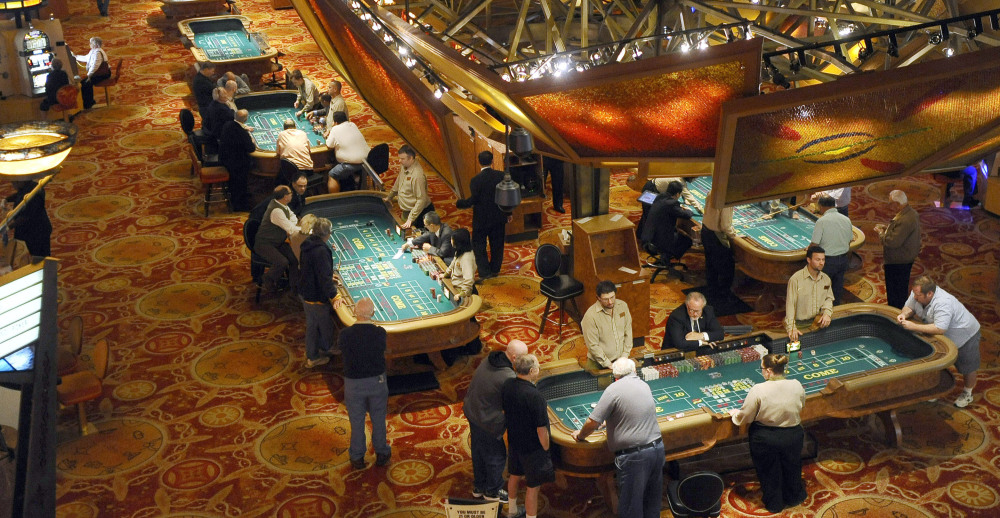BOSTON — A casino arms race is ramping up in the Northeast.
Lawmakers worried about losing jobs and revenue are proposing expansion of the gambling industry in the increasingly casino-crowded region.
Foxwoods, Mohegan Sun and other well-established gambling houses, meanwhile, are making moves to shore up business as MGM, Wynn and other new rivals prepare to open their doors.
“It could get nasty in New England,” said Keith Foley, a senior vice president at Moody’s Investors Service in New York. “You’ve got a cold war going on. Everybody is trying to protect their border.”
In Connecticut, lawmakers made a surprise pitch for opening up to three new casinos this week, including an unprecedented joint venture between Mohegan Sun and Foxwoods, which are also planning major improvements to their flagship casinos.
The key driver in the region’s ever-changing casino calculus: No less than three casinos are opening in Massachusetts in the coming years.
“Massachusetts has declared economic war on us,” said Connecticut Senate Majority Leader Robert Duff, a Democrat. “And we’re going to fight back.”
At Suffolk Downs, a horse track in Boston, Patrick Pelosi thought the prospect of so many new casinos in New England sounded like overkill.
“One or two new ones in Massachusetts would have been more than enough,” the Chelsea resident said while placing simulcast bets Friday. “We’ve been dying for one up here forever. Now they want to put 10 of them in? Come on. That’s completely out of control.”
GOING THE DISTANCE, OR NOT
Other gamblers said they looked forward to having closer options than the Connecticut casinos, which are about two hours away from Boston, and Rhode Island’s more modest Twin River Casino, which is about an hour away.
Many said they were eagerly awaiting the projected 2017 opening of Steve Wynn’s flashy, $1.7 billion casino across the river from Boston. Few said they would be wooed by MGM’s planned casino in Springfield, about an hour and a half drive west from Boston.
“I might check it out, if I was going with friends just to see it,” said Walter Craig of Medford. “But if it was just me, I might as well go to Foxwoods if I’m going that far.”
Nick Pepe of Revere said he’d be less inclined to check out Penn National Gaming’s planned slots parlor in southern Massachusetts when it opens in June because it will not offer blackjack and other table games.
“I’d rather go the extra distance to Twin River,” he said. “I go there all the time because it’s close and Foxwoods is too far.”
Casino experts say it’s too soon to say how the region’s casino landscape will shake out. What’s clear is that New England casinos will increasingly be fighting over smaller shares of the regional economic pie as new facilities come online.
“It’s very simple math: The more supply you have with the same amount of people, you’re going to share it,” Foley, of Moody’s, said. “These things will cannibalize each other, but what they are hoping is they will cannibalize from the other jurisdictions to keep the money in state.”
ATLANTIC CITY’S BAD LUCK
Alan Woinski, president of Gaming USA Corp., a New Jersey-based gambling consultancy, said Atlantic City provides a cautionary tale. The seaside New Jersey city saw four of its 12 casinos close in quick succession last year, after years of declines in the face of new rivals, from the Connecticut casinos to, more recently, Philadelphia- and New York City-area ones.
“Common sense tells you that you’re not going to get that business from Massachusetts once those new casinos open,” Woinski said. “Once it goes, it does not come back.”
Still, analysts suggest there remains room for growth in the broader Northeast region, where casinos are opening faster than perhaps any other part of the country. Some 60 gambling facilities are projected to be in operation from Washington, D.C., to Maine by 2018.
“We’re not all tapped out,” said Steven Norton, an Illinois-based gambling consultant and former executive at the Resorts casino and hotel in Atlantic City.
The American Gaming Association, an industry lobbying group, has also pushed back against the notion of oversaturation.
“This is a competition among states right now to put into place policies that will allow the casinos in their state to best compete,” said spokesman Christopher Moyer.
But Clyde Barrow, a casino expert at the University of Texas-Rio Grande Valley, wrote in a recent report that much of the region’s growth will continue to come at the cost of “legacy states” like Connecticut and New Jersey that enjoyed regional monopolies for decades.
Anti-casino activists, meanwhile, warn that casino expansion might make sense for the industry, but not necessarily for the state and local governments that look to them for revenue.
“States are buckling under the pressure of casino interests and using the excuse of budget shortfalls to plunder the pockets of their citizens,” said John Ribeiro, a Massachusetts resident who chaired last year’s failed campaign to repeal the state’s casino law. “Elected officials don’t have the foresight to understand that casinos are a lose-lose for all except the owners.”
Send questions/comments to the editors.



Success. Please wait for the page to reload. If the page does not reload within 5 seconds, please refresh the page.
Enter your email and password to access comments.
Hi, to comment on stories you must . This profile is in addition to your subscription and website login.
Already have a commenting profile? .
Invalid username/password.
Please check your email to confirm and complete your registration.
Only subscribers are eligible to post comments. Please subscribe or login first for digital access. Here’s why.
Use the form below to reset your password. When you've submitted your account email, we will send an email with a reset code.